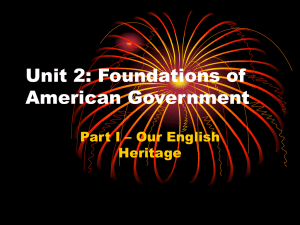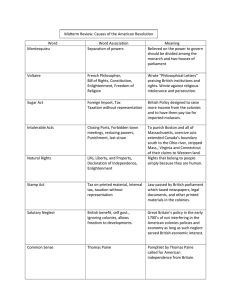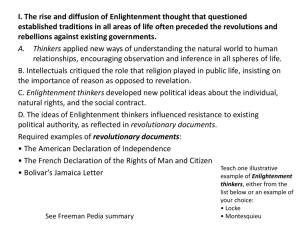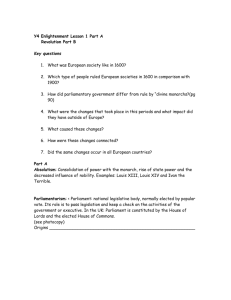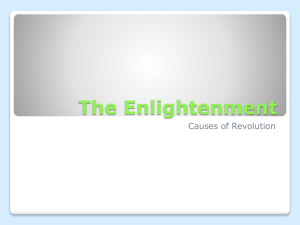The Enlightenment and the English and American Revolutions
advertisement
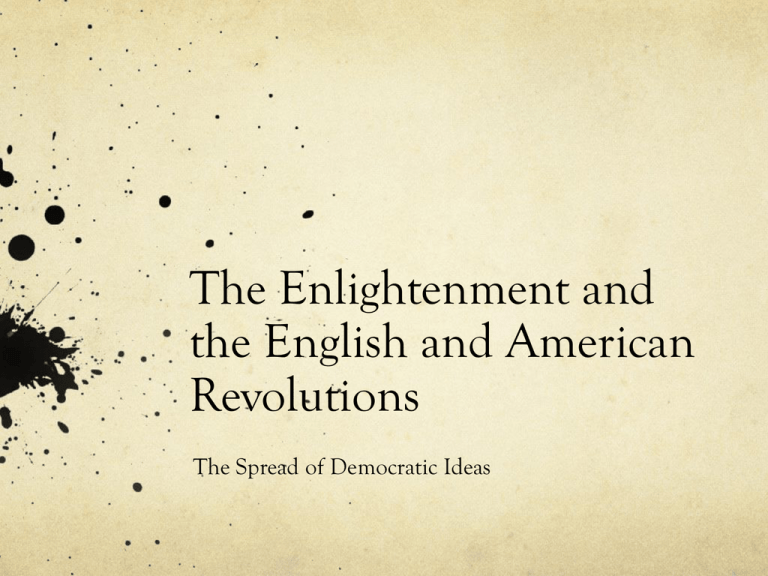
The Enlightenment and the English and American Revolutions The Spread of Democratic Ideas Limited Monarchs In 1215 a group of wealthy English landowners forced the king to accept the Magna Carta, limiting his power. After that the King had to consult the Parliament, an English law making group. This created a limited monarchy in England The royal courts established common law, a legal system based on court rulings. The Enlightenment The Enlightenment began in the early 18th century, the 1700’s. The Enlightenment was also called The Age of Reason Enlightenment thinkers believed that human beings could solve scientific and social challenges with the human mind. The Philosophes The Enlightenment thinkers were called Philosophes. These were thinkers who wrote about science and society. For example, Voltaire, wrote about freedom of religion, thought and speech. Montesquieu believed in the separation of powers in government. Locke versus Hobbes Thomas Hobbes believed a strong government was necessary because people were naturally selfish and corrupt. Therefore, Hobbes thought people should accept total power from a King, called an absolute monarch. John Locke believed most people were moral and that all people had natural rights to life, liberty and property Locked believed government should protect these rights and serve the people. The English Revolution In the 1600’s England had a civil war, which is a conflict between two parts of the same society. The Parliament opposed the King. Finally, in 1689 the Parliament demanded that the new King and Queen accept the English Bill of Rights. English Bill of Rights The English Parliament declared: The King could not end laws made by Parliament People could petition, or sign a list of grievances, against the king. People could freely elect the Parliament. People had freedom of speech. People could not receive cruel punishments for crimes. The American Revolution In 1776 the thirteen colonies declared their independence from Britain. The American colonists resented being taxed by the British, without being represented in the Parliament. Although they were rebelling against the British, many of the ideas for the American Revolution came the Natural Rights philosophy of John Locke. The Declaration of Independence Jefferson wrote in the Declaration of Independence in 1776. “We hold the truths to be self evident that all men are created equal. That they are endowed by their creator with certain unalienable rights, among these are: life, liberty, and the pursuit of happiness.” The Declaration stated the reasons that the 13 colonies wanted to be independent. The US Forms a Republic After the overthrow of the British, the Americans created a republic, or representative democracy. Most colonists wanted no king, but an elected President. The Congress, like the Parliament, made laws. Americans formed a court system, much of it based on English Common Law. Before the Constitution was ratified it included a Bill of Rights, similar to the English Bill of Rights, to protect citizens against an unfair national government.
